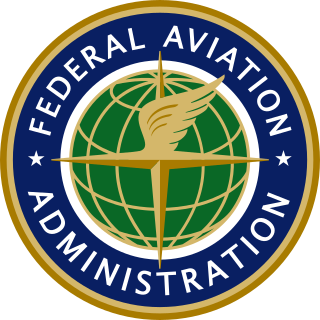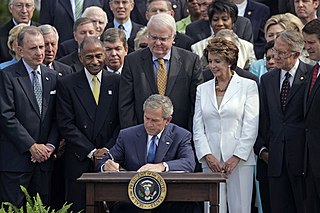Related Research Articles

The Federal Aviation Administration (FAA) is the largest transportation agency of the U.S. government and regulates all aspects of civil aviation in the country as well as over surrounding international waters. Its powers include air traffic control, certification of personnel and aircraft, setting standards for airports, and protection of U.S. assets during the launch or re-entry of commercial space vehicles. Powers over neighboring international waters were delegated to the FAA by authority of the International Civil Aviation Organization.

The PATRIOT Act was a landmark Act of the United States Congress, signed into law by President George W. Bush. The formal name of the statute is the Uniting and Strengthening America by Providing Appropriate Tools Required to Intercept and Obstruct Terrorism Act of 2001, and the commonly used short name is a contrived acronym that is embedded in the name set forth in the statute.
The Railway Labor Act is a United States federal law that governs labor relations in the railroad and airline industries. The Act, enacted in 1926 and amended in 1934 and 1936, seeks to substitute bargaining, arbitration, and mediation for strikes to resolve labor disputes. Its provisions were originally enforced under the Board of Mediation, but they were later enforced under a National Mediation Board.

United Parcel Service is an American multinational shipping & receiving and supply chain management company founded in 1907. Originally known as the American Messenger Company specializing in telegraphs, UPS has grown to become a Fortune 500 company and one of the world's largest shipping couriers. UPS today is primarily known for its ground shipping services as well as the UPS Store, a retail chain which assists UPS shipments and provides tools for small businesses. UPS offers air shipping on an overnight or two-day basis and delivers to post office boxes through UPS Mail Innovations and UPS SurePost, two services that pass on packages to the United States Postal Service for last-mile delivery.

The Labor Management Reporting and Disclosure Act of 1959, is a US labor law that regulates labor unions' internal affairs and their officials' relationships with employers.

The International Brotherhood of Teamsters (IBT) is a labor union in the United States and Canada. Formed in 1903 by the merger of the Team Drivers International Union and the Teamsters National Union, the union now represents a diverse membership of blue-collar and professional workers in both the public and private sectors, totalling about 1.3 million in 2015. The union was formerly called the International Brotherhood of Teamsters, Chauffeurs, Warehousemen and Helpers of America.
James Phillip Hoffa is an American labor leader and attorney who was the tenth General President of the International Brotherhood of Teamsters. He is the son of Jimmy Hoffa. Hoffa was first elected in 1998, and subsequently re-elected in 2001, 2006, 2011, and 2016 to five-year terms. In 2018, Hoffa was elected chair of the Road Transport Section of the International Transport Workers' Federation at its quadrennial Congress in Singapore. Hoffa is the second-longest serving General President of the Teamsters Union, after Dan Tobin, who served from 1907 to 1952. Hoffa's final term as General President ended in 2022.
In labor law, a union shop, also known as a post-entry closed shop, is a form of a union security clause. Under this, the employer agrees to either only hire labor union members or to require that any new employees who are not already union members become members within a certain amount of time. Use of the union shop varies widely from nation to nation, depending on the level of protection given trade unions in general.
The Employee Free Choice Act is the name for several legislative bills on US labor law which have been proposed and sometimes introduced into one or both chambers of the U.S. Congress.
The Emergency Economic Stabilization Act of 2008, often called the "bank bailout of 2008" or the "Wall Street bailout", was proposed by Treasury Secretary Henry Paulson, passed by the 110th United States Congress, and signed into law by President George W. Bush. It became law as part of Public Law 110-343 on October 3, 2008, in the midst of the financial crisis of 2007–2008. It created the $700 billion Troubled Asset Relief Program (TARP) to purchase toxic assets from banks. The funds were mostly redirected to inject capital into banks and other financial institutions while the Treasury continued to examine the usefulness of targeted asset purchases.
The Federal Reserve Transparency Act of 2015 was a bill introduced in the U.S. House of Representatives of the 114th United States Congress by Congressman Thomas Massie (KY-4). It included proposals for a reformed audit of the Federal Reserve System. The Senate version was introduced by Senator Rand Paul (R-KY)..
A paper local is a local union with no or few members, chartered by an existing union or self-chartered, and formed for the purpose of criminal activity. As implied by the name, paper locals often "exist only on paper", and have no members. In some cases, however, paper locals may have members, but the members are not workers but rather friends, family members, or criminal associates of the individual or individuals in control of the paper local.
The California Agricultural Labor Relations Act (CALRA) is a landmark statute in United States labor law that was enacted by the state of California in 1975, establishing the right to collective bargaining for farmworkers in that state, a first in U.S. history.
Communications Workers of America v. Beck, 487 U.S. 735 (1988), is a decision by the United States Supreme Court which held that, in a union security agreement, unions are authorized by statute to collect from non-members only those fees and dues necessary to perform its duties as a collective bargaining representative. The rights identified by the Court in Communications Workers of America v. Beck have since come to be known as "Beck rights," and defining what Beck rights are and how a union must fulfill its duties regarding them is an active area of modern United States labor law.
The Employee Rights Act (S.1774), or ERA, is a bill re-introduced to the 115th Congress in the United States Senate on September 7, 2017, by Sen. Orrin G. Hatch [R-UT] and 14 co-sponsors. The bill was referred to the United States Senate Committee on Health, Education, Labor and Pensions. It is the successor to bills first introduced in the 112th Congress of the same name, also sponsored by Sen. Hatch and then-Rep. Tim Scott of South Carolina.

The Pandemic and All-Hazards Preparedness Reauthorization Act of 2013 is a law enacted by the 113th United States Congress. The Act amends the Public Health Service Act in order to extend, fund, and improve several programs designed to prepare the United States and health professionals in the event of a pandemic, epidemic, or biological, chemical, radiological, or nuclear accident or attack. The Act clarifies the authority of different American officials, makes it easier to temporarily reassign personnel to respond to emergency situations, and alters the process for testing and producing medical countermeasures. The Act is focused on improving preparedness for any public health emergency.

The U.S. Congress enacted major amendments to the Voting Rights Act of 1965 in 1970, 1975, 1982, 1992, and 2006. Each of these amendments coincided with an impending expiration of some of the Act's special provisions, which originally were set to expire by 1970. However, in recognition of the voting discrimination that continued despite the Act, Congress repeatedly amended the Act to reauthorize the special provisions.
FlyersRights.org is a United States based not-for-profit organization that advocates for the rights and interests of airline passengers. It maintains a staffed office in Washington, D.C. for advocacy before all three branches of the US Federal Government. It operates a toll-free telephone Hotline, an email helpline for individual air travelers and a website with a 'Know Your Rights' online guide. It issues research and policy papers, conducts surveys, sponsors online petitions, maintains an active website and social media presence, provides expert advice on aviation consumer issues to public policy makers and opinion leaders and engages in public education activities.

The Aviation Innovation, Reform, and Reauthorization (AIRR) Act was a bill introduced on February 3, 2016, in the 114th Congress (2015-2016) by Congressman Bill Shuster (R-PA) and Frank LoBiondo (R-NJ). Among other things, the bill would have privatized the American air traffic control (ATC) system. The bill would also have reauthorized the Federal Aviation Administration (FAA) through 2019.
The Butch Lewis Act is an act of the United States Congress that would allow the United States Treasury to provide financial assistance to failing multiemployer pension plans. This assistance would come in the form of grants that would not need to be repaid to the Department of Treasury and would allow retirees to receive the entirety of their pension benefits.
References
- ↑ , UPS Teamsters Master Agreement 2008-2013
- 1 2 3 4 'Brown Bailout?' Hardly, FactCheck.org, July 20, 2009. Retrieved on June 21, 2010.
- ↑ FedEx FedEx drivers aren't pilots.com, Retrieved on June 21, 2010.
- 1 2 List of committees and subcommittees bill was referred to, Retrieved on June 22, 2010.
- 1 2 Campaign Against Rival Could Haunt FedEx, NYTimes.com, June 9, 2009. Retrieved on June 22, 2010.
- ↑ Oxford American Dictionary. Retrieved on June 22, 2010.
- ↑ Top 10 Buzzwords, time.com, November 3, 2008. Retrieved on June 22, 2010.
- ↑ Initial Bailout Falling Out of Favor With Americans, gallup.com, December 9, 2008. Retrieved on June 22, 2010.
- ↑ Amendments to H.R. 915, Retrieved on June 22, 2010.
- ↑ Senate approves FAA bill but fight with House looms, govexec.com, March 23, 2010. Retrieved on June 22, 2010.
- ↑ Gov Track.us page on H.R. 915, Retrieved on June 22, 2010.